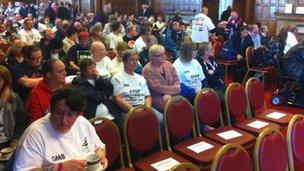Sheffield protest over Remploy factory closures
- Published

Protesters joined a meeting at Sheffield Town Hall to discuss the closures
Up to 300 people took part in a protest in Sheffield over the planned closure of factories employing disabled people.
Workers from Remploy joined the protest targeting the city's Department for Work and Pensions office.
Unions said more than 1,700 staff nationally, including 1,500 disabled employees, faced compulsory redundancy with the closure of 36 of the 54 sites.
Factories in Leeds and Pontefract will shut. The future of Sheffield and Huddersfield sites is undecided.
Remploy worker Vicki Charlesworth said: "A lot of people will not get jobs.
"What are we going to do? We are going to be in a right state."
Remploy was originally set up in the 1940s to offer sheltered and safe work for people with disabilities.
In June 2011, Liz Sayce, chief executive of disability rights charity Radar, published a report which said it cost on average £25,000 a year to keep a Remploy worker in a job.
The report suggested that money might be better spent supporting disabled people to find work in the commercial sector.
A spokesman for the Department for Work and Pensions said: "We have been absolutely clear that the £320m budget for specialist disability employment services has been protected.
"But by spending the money more effectively, we can support thousands more disabled people in work.
"That is why we have accepted the recommendation from the Sayce review, to focus support on individuals through services like Access to Work, rather than institutions like Remploy, so more disabled people can work in mainstream employment rather than segregated factories."
Mark Lever, chief executive of the National Autistic Society, said the closure would be "devastating" for employees.
"The change in routine will be particularly challenging for people with autism and steps must be taken to ensure that they are adequately equipped to deal with the transition."
- Published19 August 2011